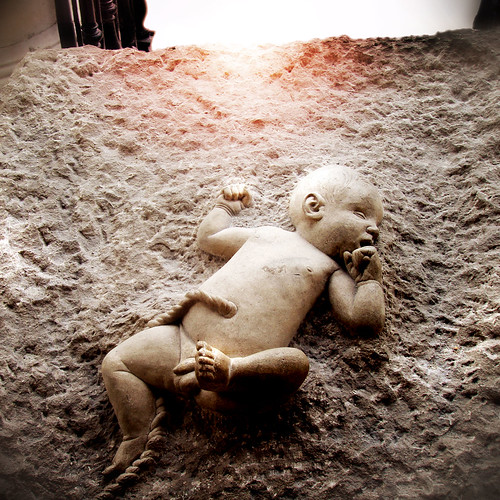
“Fearlessness in giving has to find its place at the heart of things…” (83)
1. God’s desire for us and our world is an ‘economy of gift’ (82) whereby we live by a mutual generosity. But this is not the world we live in, and none of us seem to be able to break this cycle of ‘original sin’, which is merely the observation that we are all born into this imperfect world, and exhibit this imperfection in our lives. Thus we have weaved a tangle of selfishness “that goes back to the very roots of humanity.” (82)
2. Jesus is the break in the cycle that is needed.(83) The break must be genuinely human (or it won’t break the human cycle), but it must also be divine to effect the transformation required, for only God is so utterly free as to be able to give utterly selflessly. (This selfless giving is the very nature of God, Father, Son and Spirit.) This is why the doctrine of the two natures in Christ is so important; it verbalizes the experience of being saved by a human act, but one carried out by God in person.
3. Jesus, as Son in relationship with the Father, is this living out in history of the Trinitarian life of unrestricted and utterly consistent love. Utterly consistent remember because God is an utter fullness of love already and does not need us in this sense.) And in him this love is turned also toward us, so that the love we see and receive in Jesus is the total and unselfish giving of God. Through Christ, who is both God’s love turned to us and the Son in person in relationship to the Father, the very life of God is brought into history, personally. Think of Jesus as the intersection of God’s own life of love with the world.
4. But when love meets sin, the cross is the result. (84-85) Notice some of the New Testament metaphors for the death of Jesus (87-88) Williams picks up. None are literally true (which doesn’t mean they are meaningless), but all help us understand the depth and comprehensiveness of the salvation wrought in Christ. “The single central thing is the conviction that for us to be at peace Jesus’ life has to be given up. It isn’t that a vengeful and inflexible God demands satisfaction, more that the way the world is makes it unavoidable that the way to our freedom lies through the self-giving of Jesus, even to the point of death.” (88)
5. The descent into hell, pp. 88-89. Don’t get hung up on this, the point is that Christ’s salvation is universal and complete: nowhere is safe from it! The dereliction of the cross finds its nadir in the descent to the dead/hell, that place of utter godforsakenness. This follows the logic of the substitution of the cross to its (theo)logical conclusion.
6. Interesting argument for the reality of the bodily resurrection of Jesus, not just as a personal/psychological appearance (91-2). The resurrection is the triumph of God over evil and sin, but the theology of resurrection focuses on Jesus, not this triumph in abstract terms. This suggests that the disciples could not dispense with Jesus when talking of resurrection.
7. Through the giving of the Spirit to us (see John 20) we receive the new humanity that is possible through Jesus ‘the break’ in original sin. The cycle is broken in him, and transmitted to us. (92) This Spirit we receive is not just a Spirit of loving other people, but is the Spirit of the love of Father and Son, the love that is free and unrestricted self-giving. (The latter is possible because of the former.) This parallels Jesus’ relationship with the Father on the one hand, and on the other hand, his relationship to the world.
8. The victory of Christ and the giving of the Spirit now have led some to think that the end has already come. Wrong. And this includes all those who cease to act rightly because they believe the end is nigh. We are assured of the future victory, but as the future. (This is one reason why it is important to see the resurrection as the future come to meet us, rather than a past event like the cross. The victory is not locked in the past, ineffective against current evils.)
9. In speaking of the second coming, Williams remembers a saying of Luther who said that if he knew the world was ending tomorrow he would plant a tree today! This is because to do so is good in itself, and doing good is important no matter how short the time frame. (98) So caring for the environment, or doing justice, is the right thing to do and to do now, even though the resurrection will transform everything.
10. Notice the interesting interpretation of ‘Lead us not into temptation’ (99). The light of Christ’s love is not just all beer and skittles. There is the pain of transformation, transforming the persons we have made ourselves by following the channels of original sin. Williams says that ‘save us from the time of trial’ is asking to be spared this final transformation until we have had the time to do some more work now, so that the final judgment won’t be quite so painful. 11. Sharing in the communion of Holy Spirit doesn’t just mean receiving an external gift, but receiving the Spirit that transforms our very natures. (101) What we share – our human nature – is transformed into the likeness of Christ himself. (The Word of God, by becoming an obedient human person, perfects our nature, and this perfection is transferred to us.) This new nature echoes the Trinitarian life itself, a nature that is constituted by mutual giving and receiving. (102) Thus the cycle of original selfishness, broken in Christ, becomes universal















